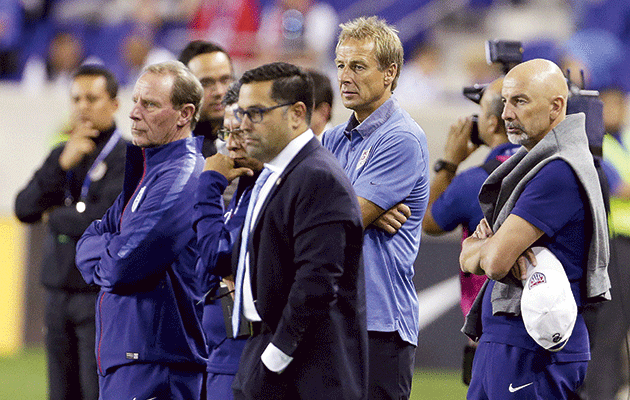Since defeat by Mexico in the 2017 Confederations Cup play-off and an Olympic qualifying loss to Honduras – which came within hours of each other on Saturday, October 10 – the criticism of Jurgen Klinsmann has been growing, putting both his jobs at stake. National coach since July 2011, the 51-year-old German was given a four-year contract extension by US Soccer Federation president Sunil Gulati in December 2013 that upped his salary to an estimated $4million a year. He was also handed the additional responsibility of technical director.
Part of Gulati’s reasoning was that Klinsmann was much sought after by other countries, so it was essential to secure him to a long-term contract. But there were those who felt results over the previous two years did not warrant such a move.
Setting out to prove the doubters wrong at the following summer’s World Cup, the USA made it out of what Klinsmann called a “group of death – the worst of the worst”. But while he claimed reaching the knockout stage was a triumph, Klinsmann’s team did nothing new.
The USA made it to the second round in 2010, under Bob Bradley, when they won their group, and in 2002 Bruce Arena took the team to the quarter-finals.
Nor was there anything remarkable in the USA’s play in Brazil. They never looked comfortable on the ball, failed to develop any rhythm or showed little hint of a style of play.
Despite the national side’s recent poor results – the most recent of which was a 1-0 loss at home to Costa Rica on October 13 – nothing has been heard from Gulati beyond a statement that he would be meeting with Klinsmann, as he always did after games, to discuss how things were going. But things have not got any better and, on October 24, the USA failed
to qualify from the group stage of the Under-17 World Cup in Chile.
Klinsmann is also under attack for his obsession with foreign coaches – his staff containing the German duo of Berti Vogts and Matthias Hamann, with Austria’s Andi Herzog running the Olympic team. While many feel the Olympic team should be coached by an American, Klinsmann has made it clear that he does not hold a high opinion of American soccer – and that means both its coaches and its players. So far he has tracked down and recruited over half-a-dozen players, mostly from Germany, who are American passport holders and therefore qualified to play for the national side.
He has sounded off more than once about the training young American players undergo – a direct criticism of Major League Soccer. Indeed, in 2014, his constant sniping moved MLS commissioner Don Garber to publicly and harshly rebuke him, describing Klinsmann’s comments as “very, very detrimental to the league…to everything we’re trying to do”.
Nor are Klinsmann’s dealings with his players exactly private. He has openly criticised Clint Dempsey and Michael Bradley for leaving Europe and then returning to MLS. And after the recent Mexico game, he sent Fabian Johnson (one of his German-Americans) back
to Germany and told the world that it was because he had asked to be substituted.
The worst example of Klinsmann’s apparent need to put the blame on his players came when he dropped Landon Donovan from the 2014 World Cup squad. In purely football terms, the move looked to be ridiculous and came over as being done simply out of spite. As Arena put it: “If there are 23 players better than Landon, then we have a chance to win the World Cup.”
Perhaps the most serious of Klinsmann’s faults is his obvious reluctance to select Hispanic players. The squad that he took to the 2014 World Cup included just two while there were seven “passport” Americans.
The next big test for Klinsmann – it being a pretty safe assumption that Gulati will not remove him – will be the Concacaf World Cup qualifiers which start in November. Except that it is not really a test at all. Concacaf has three guaranteed World Cup berths and it is absurd to imagine that the US will not stroll through the qualifiers to take one of those.
If results matter, if player selection and team tactics matter, if erecting a structure that includes the huge – and growing – number of Hispanic players matters, then Klinsmann should be out of a job, for he scores poorly in all those areas.
What he is good at is PR. His constant smile, his friendliness and his willingness to talk with supporters make him a popular figure among many. After the Mexico debacle he even managed to make his defiant – or was it embattled? – “I’m not here to be liked” come over as something likeable.
It does not surprise that some of the most pointed criticism of Klinsmann has come from Donovan, who said before the loss to Mexico: “Around the world, if a player plays poorly they get dropped from the team. We had a very poor summer with bad results in the Gold Cup.
“The reality is that, anywhere else in the world, if a coach had those results, and they lose this game against Mexico, they’d be fired. I think Jurgen has to be held to that standard too.”
By Paul Gardner






